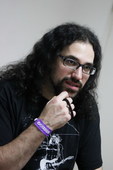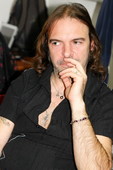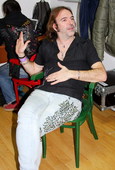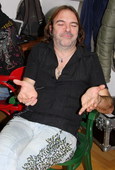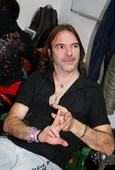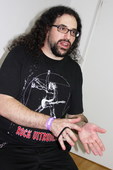Mago De Oz
A Kind Of Magic
28.01.2015
Архив интервью | Русская версияSeeing Spanish kings of folk metal Mago De Oz play in Moscow for the first time ever was for us definitely the most positive musical surprise of the year 2014. But doing a face-to-face interview with the band was something bordering on a miracle. However, if you are familiar with the band, you will agree that Mago De Oz and miracles are not so far apart. Just check out some of their classic records, such as “Finisterra” (2000), or “Gaia” (2003) – the art that they create is absolutely unrivalled in their genre. To make a long story short, here we are, backstage at Club Stadium Live in Moscow, sitting together with Carlos Mohamed (violin), Patricia Tapia (vocals) and Javier Diez (keyboards, guitar), who have just done a very energetic show at Aria Fest, but are still full of joy and passion to share with us their thoughts about the origins of the band’s style, their lyrical message and the power the music has over the people…
How did you like today’s performance? Did you enjoy the stage, the organization and the audience?
Javier: Are you kidding me?! It was great! It’s our first time here, and the crowd was awesome. The stage was awesome, too, the sound could have been better, but we understand that there are four bands playing, and we didn’t have enough time to prepare for the show. But given it’s our first time here, we are more than grateful.
Carlos: I saw that people sang our songs, danced to our songs. Mago De Oz came here for the first time, and we didn’t know if the people knew our songs…
Javier: We’d been for the first time in other countries, and it’s never been like that. It’s one of the best first shows we’ve had.
Patricia: Someone had told us that people here are not so active, they don’t jump. When we play, we make a really strong show, we dance and jump ourselves. And when we played we saw the people actually jump and clap and shout, and it really made us happy.
Did you have the chance to see any of the city?
Javier: Just a little. We came this morning, and we’re leaving tomorrow morning.
Patricia: I bought a hat!
It’s called “ushanka”…
Patricia: … and “babushka” – these are the only Russian words we know. (everybody laughs)
You have so many albums and so many songs. How do you put together the setlist? How do you decide what songs you are playing and what songs you are not playing?
Carlos: It was not difficult this time, as it’s the first time we play here, and we wanna play the best songs of our career. We only had 50 minutes, and over these 50 minutes we had to play the best songs we’ve got.
Let’s speak about your latest album “Ilussia”, which was released in October. What can you say about its composition and recording?
Carlos: There is always some evolution in our music. We hear new music, and we want to evolve in our music. This is a story that takes place in an abandoned circus. All our concerts and all our CDs have a concept that is audio-visual. There is mysticism, there is music, and there is image. “Ilussia” comes from the evolution of our music. But it is still Mago De Oz. The music is the sound of Mago De Oz, but it has evolved to modern Mago De Oz.
Shortly before “Ilussia” you released the first Mago De Oz record in English, “Celtic Land” (2013). How was it received in English-speaking countries? Did it help the band become more successful outside the Spanish-speaking world, so to say?
Carlos: No. The album happened because we have many friends. We called them and said, “Do you wanna sing our songs on a record?” And they said, “Of course!” But when we come to Europe, Russia or other countries, everybody says, “Don’t worry! Sing in Spanish!” It was very good to sing in English, but people want us to sing in Spanish. And it’s surely better for us! (everybody laughs)
In your opinion, how difficult it is to understand the essence, the message of Mago De Oz, if a listener does not speak Spanish? In other words, how much the non-Spanish speaking people miss when they listen to Mago De Oz?
Javier: It’s very easy to enjoy a song without understanding the lyrics. We all were children, and we always loved the songs that we didn’t understand. But as to Mago De Oz lyrics, if you’re missing the meaning of the lyrics, you’re missing 90 percent of a song. People who love Mago De Oz love the lyrics. It was one of the reasons why we recorded “Celtic Land”. A lot of the people don’t speak Spanish, but really love the band.
Have you considered putting English translations of your lyrics into CD booklets? Some bands do that, and it helps people understand what the songs are about…
Javier: The lyrics are a kind of mess, because you can’t translate them into another language without losing some of the meaning. There is so much poetics in the lyrics, so many anagrams and other stylistic devices…
Patricia: When we did the lyrics for “Celtic Land”, we called a friend, she knows English very well, she works as a translator, and she helped us translate the lyrics from Spanish into English. Some of the lyrics turned out more or less the same in their meaning, but some others were impossible to be translated. The words in English and the words in Spanish are not the same, but we managed to more or less keep the meaning.
Mago De Oz, of course, combines heavy metal with a lot of folk elements. Celtic themes are definitely recognizable, but what other styles and cultures are there?
Carlos: Many people believe that for Celtic music you need to go to France or to Wales. No, this music is in Spain. We love Celtic music, it is principal, but we are not limited to only rock and Celtic music. We have a lot of influences. We wanna embrace all of music, because this is Mago De Oz. We also have classical music, folk music of Mexico or Peru, and much more in our sound.
Javier: We really like folk music, and it doesn’t matter where it comes from. From the north to the south of Spain, folk music is different, and so is our music.
A friend of ours went to Barcelona a couple of months ago, and he tried to find older Mago De Oz albums like “Finisterra” or “Gaia” in shops, but it turned out that they are out of print. What happened, and does the band have any plans to re-release them?
Carlos: Our first company, Locomotive Records, stole a lot of CDs from us. We are in court against them. We are talking with other record companies, they tell us, “Can we sell your early records?” Yeah, no problem!
Mago Do Oz when through various major line-up changes over the years, and the most serious of them was the long-time singer, Jose Andrea, leaving the band in 2012. What actually happened to Jose?
Carlos: He had his own band, and we ran into a situation when we were playing with Mago De Oz and he was playing with his own band in Spain or wherever he can. For the band it is important that its members regard Mago De Oz as a priority, and Jose Andrea had his own career. But it’s OK, we are still here.
Well, here’s a question to newer members of the band. How did each of you get a job with Mago De Oz?
Javier: It was a cold evening in 2008… (everybody laughs) I was playing in the band of Jorge Salan, who was at that time a guitar player of Mago De Oz, and he told me, “Hey, Mago De Oz lost their keyboard player (Kiskilla) because he had just become a father for the first time. They need a keyboard player for the South American tour. Do you wanna come?” When he told me about it, I was shocked, I said…
Carlos (interrupts): “I don’t know… Maybe yes, maybe no”… (everybody laughs)
Javier: I said “absolutely yes”. I did this tour, we went to South America for two months. It was my first experience outside Spain, and it was total madness. When we came home, Txus (drums) called me again, he said, “Hey Javi, how are you? We are preparing a new album, ‘Gaia III’, and we are calling you to work with us and compose with us. We have a keyboard player, but we want you to be in the team”. I said “yes” in no time…
Carlos (interrupts): …”and my life became absolutely crazy”… (everybody laughs)
Javier: In 2012, two years ago, there was the big change in the band, Jose Andrea left, Kiskilla left, Peri (bass) left, and Txus offered me the job. I became a member of the band, and I’m still in it.
Patricia, now it’s your turn…
Patricia: Nine years ago they called me, because they were looking for a singer to take part in the solo album of Jose Andrea. He recorded an album called “Donde el corazon te lleve” (2004), and I recorded one song with him, “El peso del alma” (a cover version of Hammerfall’s “Glory To The Brave” with Spanish lyrics – ed.). After that they told me, “Why don’t you record on the next album of Mago De Oz?” I said, “Of course! (laughs) Why not?” After that they told me, “Why don’t you come with us on tour?” I said, “Of course! Why not?” Nine years later, I’m here with them! It is really special for me. Sometimes I recall this time and this day, and I say, “Oh my God, it’s amazing! I love my life!”
Carlos: They are not only musicians, they are composers, they are part of our vehicle. Mago De Oz would be nothing without a female voice!
Patricia (expresses being extremely flattered): Oooh! (everybody laughs)
Patricia, you also have your own project Patricia Tapia KHV. Can you say a few words about it?
Patricia: I have three albums with it, the last one is called “Genesis” (2014). It’s a rock band with elements of electronic music. I play with it when I can.
Carlos: She is the best female singer in the world! (laughs)
Patricia: Carlos recorded violin for one song on the first album (“Volver a creer”, 2010), and Frank and Carlitos (Mago De Oz guitarists) sometimes come to play some shows with me. It’s a lot of fun to do it when I can, when we are not on tour with Mago De Oz.
Mago De Oz are one of the first Spanish rock and metal bands to come and play in Russia. In your opinion, why do the Spanish bands get so little exposure in mainland Europe?
Javier: I think Spanish rock bands are not really famous even in Spain. The rock culture is so poor in Spain. There are so places to play, rock bands don’t have access to mainstream media…
Patricia: And the economic situation in Spain is very bad, we are in crisis.
Javier: As long as Spanish bands are not really famous in Spain, it’s not possible to become famous outside Spain. Mago De Oz are one of the few bands who have managed to make it. But it’s not really luck, it’s hard work over many years.
Mago De Oz is a band that speaks out their opinion on various important things in the lyrics. But in your opinion, can the music of Mago De Oz, and music in general, change something in the world?
Carlos: There are two things that are really important to the world: music and love. We are not on a mission to change the world, but music can change the people. If so many people are watching and hearing you, music has the power to spread around and make people think. Mago De Oz sing about love, about compassion, about the state of the planet. We can’t make people change the world, but we can make them think about what we’re singing about. We are not a political band, we don’t have politics in the lyrics, we are singing about the air or about the waves, but what you make out of it, and what you do with it, is up to you.
Mago De Oz on the Internet: http://www.magodeoz.com
Special thanks to Natalia Stupnikova and Alexey Kuzovlev (Aria Fest) for arranging this interview
Interview by Roman Patrashov, Natalia “Snakeheart” Patrashova
Photos by Natalia “Snakeheart” Patrashova
November 30, 2014
© HeadBanger.ru

